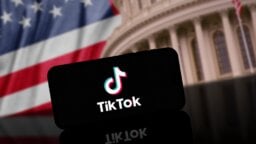The US government has reportedly told ByteDance-owned TikTok that it faces a potential ban in the US unless the app’s Chinese owners divest their stakes in the company.
The news was first reported by The Wall Street Journal on Wednesday (March 15), citing people familiar with the matter.
Citing a TikTok spokesperson, Reuters reports today (March 16) that the company was recently contacted by the Committee on Foreign Investment in the US (CFIUS), which oversees national security risks in cross-border investments.
The committee is currently carrying out a national security review of TikTok and the app last year agreed to implement a number of measures under a plan dubbed “Project Texas.”
Bloomberg reports that the CFIUS has stalled in its review process, leaving TikTok’s plans in the US hanging in the balance.
TikTok executives have claimed that 60% of its parent company, ByteDance, is owned by global investors, while 20% are owned by employees and 20% by its founders, the WSJ said.
However, the founders’ shares carry outsized voting rights, says the report.
The reported demand and potential ban of TikTok is the latest hurdle for the Chinese company after the US House Foreign Affairs Committee on March 1 voted to advance a bill that would give President Joe Biden powers to ban TikTok in the US.
It follows a 30-day deadline set by the White House’s Office of Management and Budget for the app to be deleted from Federal employee devices due to national security concerns.
But TikTok has repeatedly argued that the company does not pose risks to national security. Reuters reported that TikTok has so far spent more than $1.5 billion on data security efforts.
On Wednesday, TikTok said a forced sale of Chinese owners’ stake in the company would not address the perceived security risk, the WSJ reported.
“If protecting national security is the objective, divestment doesn’t solve the problem: a change in ownership would not impose any new restrictions on data flows or access,” TikTok spokeswoman Brooke Oberwetter was quoted by the WSJ as saying.
“The best way to address concerns about national security is with the transparent, US-based protection of U.S. user data and systems, with robust third-party monitoring, vetting, and verification, which we are already implementing,” Oberwetter added.
Over a week ago, a bipartisan group of senators introduced a bill that would allow the government to regulate or ban technologies produced overseas such as TikTok.
The bill, called Restricting the Emergence of Security Threats that Risk Information and Communications Technology Act, or RESTRICT Act, would give the US secretary of commerce powers to regulate technology produced by China, Cuba, Iran, North Korea, Russia and Venezuela.
The White House endorsed the bill, saying it would empower the US government “to prevent certain foreign governments from exploiting technology services operating in the United States in a way that poses risks to Americans’ sensitive data and our national security.”
“Critically, it would strengthen our ability to address discrete risks posed by individual transactions, and systemic risks posed by certain classes of transactions involving countries of concern in sensitive technology sectors,” the White House’s National Security Advisor Jake Sullivan said.
Meanwhile, last month, The European Commission, the European Union’s executive arm, also banned its staff from using the ByteDance-owned video app on their work phones over cyber security concerns.
The European Parliament also banned its staff from using TikTok this week.
TikTok has around 100 million users in the US.
Back in September 2020, when the prospect of a temporary US ban of TikTok from the Trump administration was becoming headline news, the app’s then-interim head (now COO), Vanessa Pappas estimated that if a US ban of TikTok was in place for six months, over 80% of its daily users would not return to the platform.
That prediction was based on TikTok’s real-life experience of being banned for a fortnight by the Indian government in 2019, according to Reuters.Music Business Worldwide





